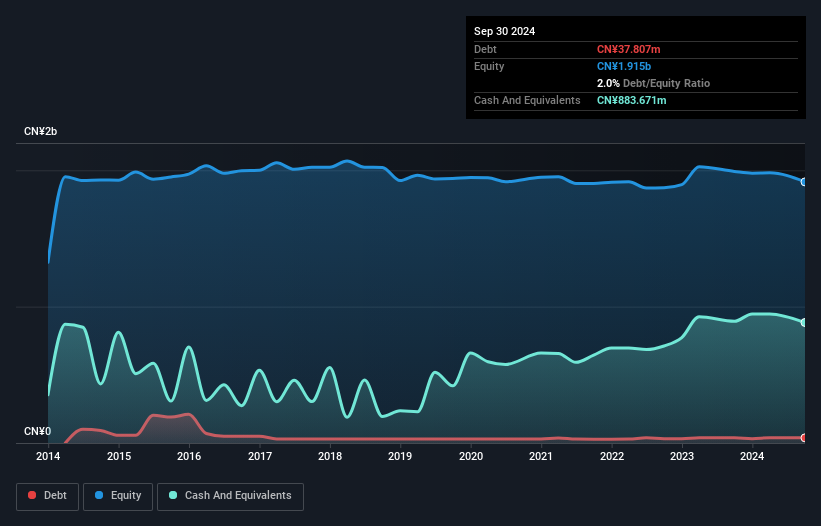Does Shanghai Jinfeng Wine (SHSE:600616) Have A Healthy Balance Sheet?

David Iben put it well when he said, 'Volatility is not a risk we care about. What we care about is avoiding the permanent loss of capital.' So it seems the smart money knows that debt - which is usually involved in bankruptcies - is a very important factor, when you assess how risky a company is. Importantly, Shanghai Jinfeng Wine Company Limited (SHSE:600616) does carry debt. But is this debt a concern to shareholders?
When Is Debt Dangerous?
Debt is a tool to help businesses grow, but if a business is incapable of paying off its lenders, then it exists at their mercy. In the worst case scenario, a company can go bankrupt if it cannot pay its creditors. However, a more common (but still painful) scenario is that it has to raise new equity capital at a low price, thus permanently diluting shareholders. Having said that, the most common situation is where a company manages its debt reasonably well - and to its own advantage. When we examine debt levels, we first consider both cash and debt levels, together.
View our latest analysis for Shanghai Jinfeng Wine
What Is Shanghai Jinfeng Wine's Net Debt?
As you can see below, Shanghai Jinfeng Wine had CN¥37.8m of debt, at September 2024, which is about the same as the year before. You can click the chart for greater detail. But it also has CN¥883.7m in cash to offset that, meaning it has CN¥845.9m net cash.

A Look At Shanghai Jinfeng Wine's Liabilities
We can see from the most recent balance sheet that Shanghai Jinfeng Wine had liabilities of CN¥169.2m falling due within a year, and liabilities of CN¥90.7m due beyond that. Offsetting these obligations, it had cash of CN¥883.7m as well as receivables valued at CN¥52.8m due within 12 months. So it actually has CN¥676.5m more liquid assets than total liabilities.
This surplus suggests that Shanghai Jinfeng Wine is using debt in a way that is appears to be both safe and conservative. Because it has plenty of assets, it is unlikely to have trouble with its lenders. Succinctly put, Shanghai Jinfeng Wine boasts net cash, so it's fair to say it does not have a heavy debt load! When analysing debt levels, the balance sheet is the obvious place to start. But you can't view debt in total isolation; since Shanghai Jinfeng Wine will need earnings to service that debt. So if you're keen to discover more about its earnings, it might be worth checking out this graph of its long term earnings trend.
In the last year Shanghai Jinfeng Wine had a loss before interest and tax, and actually shrunk its revenue by 6.4%, to CN¥567m. That's not what we would hope to see.
So How Risky Is Shanghai Jinfeng Wine?
While Shanghai Jinfeng Wine lost money on an earnings before interest and tax (EBIT) level, it actually generated positive free cash flow CN¥24m. So although it is loss-making, it doesn't seem to have too much near-term balance sheet risk, keeping in mind the net cash. We'll feel more comfortable with the stock once EBIT is positive, given the lacklustre revenue growth. The balance sheet is clearly the area to focus on when you are analysing debt. But ultimately, every company can contain risks that exist outside of the balance sheet. For example, we've discovered 1 warning sign for Shanghai Jinfeng Wine that you should be aware of before investing here.
If you're interested in investing in businesses that can grow profits without the burden of debt, then check out this free list of growing businesses that have net cash on the balance sheet.
New: Manage All Your Stock Portfolios in One Place
We've created the ultimate portfolio companion for stock investors, and it's free.
• Connect an unlimited number of Portfolios and see your total in one currency
• Be alerted to new Warning Signs or Risks via email or mobile
• Track the Fair Value of your stocks
Have feedback on this article? Concerned about the content? Get in touch with us directly. Alternatively, email editorial-team (at) simplywallst.com.
This article by Simply Wall St is general in nature. We provide commentary based on historical data and analyst forecasts only using an unbiased methodology and our articles are not intended to be financial advice. It does not constitute a recommendation to buy or sell any stock, and does not take account of your objectives, or your financial situation. We aim to bring you long-term focused analysis driven by fundamental data. Note that our analysis may not factor in the latest price-sensitive company announcements or qualitative material. Simply Wall St has no position in any stocks mentioned.
About SHSE:600616
Adequate balance sheet with questionable track record.
Market Insights
Community Narratives



